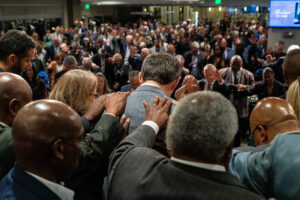
JACKSON, Tenn. (BP)–Christian leaders who think that the cultural phenomenon of Dan Brown’s novel “The Da Vinci Code” has run its course should brace themselves for continued interest in the book. Even as it continues to hold high rankings on the best-seller lists, the film adaptation is underway, with perhaps the greatest actor of our time, Tom Hanks, in the starring role.
I have heard pastors and church leaders say that they should not waste their precious time reading such a book or researching its claims. After all, the argument goes, it’s a novel, a work of fiction, so it’s not true. Why should we expend mental energy on such a work?
As literary critic, I feel compelled to clarify the danger of such a view of fiction. While there is a strong impulse to link “fiction” with “untrue,” there is more to consider than this simple equivalence. In fact, following that definition, we might presume nonfiction to be by definition “true,” which would be an especially dangerous statement. Just visit the nonfiction section of your local bookstore and you can see how much falsehood resides there.
By definition, fiction is imaginative, not untrue. In fact, fiction is a remarkably effective tool for communicating truth! The best-selling novel of the 19th century was written by a preacher’s wife, Harriet Beecher Stowe: “Uncle Tom’s Cabin,” which told the abominable truth of slavery and its toll on American society. Anyone who has read C.S. Lewis or J.R.R. Tolkien’s wonderful novels knows that they communicate the truth of the Gospel and many elements of orthodox theology in ways that are comely to believers and non-believers alike. The stories of Flannery O’Connor, William Faulkner and many others accurately depict the truth of the fallen state of humankind.
Good fiction draws readers into the plot, allowing us to identify with the characters and to invest our own emotions in the story. This is exactly why fiction is an effective medium for communicating truth; the reader’s guard is lowered while the story is being read.
This lowered guard, however, is exactly why books such as Brown’s can be perilous to careless readers. While I always encourage Christians to read broadly, I also encourage them to read redemptively. By this I mean that we should know what ideas exist in our culture’s marketplace, but we should always read with our minds grounded in a Christian worldview.
By reading redemptively, we apply a Christian, biblical worldview. We should ask at least three questions about anything we read, whether it is fiction or non-fiction: What grains of truth does it contain? What half-truths? What out-and-out lies?
When we do this, we are following the mandate of Romans 12:2: “Do not be conformed to this world, but be transformed by the renewing of your mind, that you may prove what that will of God is, that which is good and acceptable and perfect.” Our ideas should be conformed to Scripture, not Scripture to our ideas. Revealed scriptural truth must be our standard, not artificially constructed human truth.
The problem with Brown’s book is that most readers do not read with a biblical worldview. They conform their theology to Dan Brown, rather than holding up Brown’s story for scrutiny against the clear teachings of Scripture. Critics of Brown rightly have pointed out that he has simply repackaged old heresies and conspiracy theories for an age that craves mysticism and secret knowledge. People who “believe” Brown’s theories have placed his work as authoritative over and against Scripture itself. Christians, however, should elevate the Word above all other words.
As a Sunday School teacher, I find the popularity of Brown’s novel to be disconcerting. The cultural phenomena represented by novels like Brown’s are exactly why Christian leaders should either read novels of this kind or at least know what half-truths and falsehoods they contain. We should, in fact, teach our fellow believers to use their minds to engage our culture.
Our culture craves truth, even as it fails to recognize it. In the truth of God’s Word, we have a mighty sword. Too often we think that a sword must be used to slice and to divide; as novelist Anne Lamott reminds us, however, sometimes we should use the sword to point to the truth for those who need to see it.
When Daniel and his fellow captives were living in Babylon, they learned the language and the literature of Babylon (Daniel 1:4). They were able to use this training to God’s glory exactly because they refused to conform to the culture. Their ability to engage their culture with God’s truth allowed them to bring King Nebuchadnezzar to declare, “How great are [God’s] signs, and how mighty are His wonders!” (Daniel 4:3a). I pray that our fellow believers would learn to engage our culture, to point to the truth of Christ and to God’s Word, even as we navigate cultural phenomena such as “The Da Vinci Code.”
–30–
Gene Fant Jr. chairs the English department at Union University in Jackson, Tenn., and teaches in the college ministry at West Jackson Baptist Church.















